Related Research Articles

Effigy Mounds National Monument preserves more than 200 prehistoric mounds built by Native Americans. Numerous effigy mounds are shaped like animals, including bears and birds. These were built mostly in the first millennium, by peoples of the Woodland Culture. In 2017, they were featured in the America the Beautiful Quarters Program.
The Hocągara (Ho-Chungara) or Hocąks (Ho-Chunks) are a Siouan-speaking Indian Nation originally from Wisconsin and northern Illinois. Due to forced emigration in the 19th century, they now constitute two individual tribes; the Ho-Chunk Nation of Wisconsin and the Winnebago Tribe of Nebraska. They are most closely related to the Chiwere peoples, and more distantly to the Dhegiha.

Mazomanie is a village in Dane County, Wisconsin, United States. The population was 1,652 at the 2010 census. The village is located within the Town of Mazomanie. It is part of the Madison Metropolitan Statistical Area.
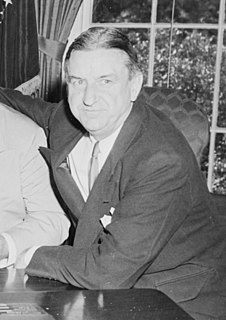
George Preston Marshall was an American businessman who was the founder of the Washington Redskins of the National Football League (NFL). He founded the team in 1932 as the Boston Braves and was its controlling owner until his death in 1969. Marshall, a supporter of racial segregation, was the last NFL owner to integrate African Americans onto a roster, only doing so in 1962 under pressure from the federal government who threatened to block the use of D.C. Stadium, which they owned, unless he did.
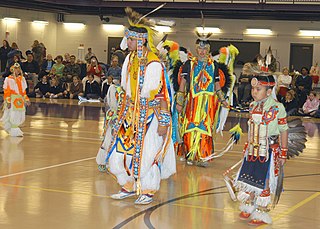
The Ho-Chunk, also known as Hoocągra or Winnebago, are a Siouan-speaking Native American people whose historic territory includes parts of Wisconsin, Minnesota, Iowa, and Illinois. Today, Ho-Chunk people are enrolled in two federally recognized tribes, the Ho-Chunk Nation of Wisconsin and the Winnebago Tribe of Nebraska.
Redskin is a slang term for Native Americans in the United States and First Nations in Canada. The term redskin underwent pejoration through the 19th to early 20th centuries and in contemporary dictionaries of American English it is labeled "usually offensive", "disparaging", "insulting", or "taboo".
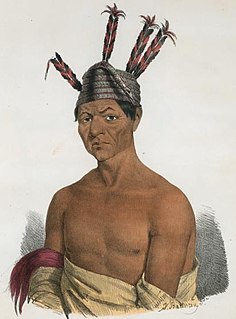
Waukon Decorah, also known as Wakąhaga (Wau-kon-haw-kaw) or "Snake-Skin", was a prominent Ho-Chunk (Winnebago) warrior and orator during the Winnebago War of 1827 and the Black Hawk War of 1832. Although not a hereditary chief, he emerged as a diplomatic leader in Ho-Chunk relations with the United States.

Charlene Teters is a Native American artist, educator, and lecturer. Her paintings and art installations have been featured in over 21 major exhibitions, commissions, and collections. She is a member of the Spokane Tribe, and her Spokane name is Slum Tah. She was born and raised in Spokane, Washington, near the Spokane Indian Reservation.
William Henry "Lone Star" Dietz was an American football player and coach. He served as the head football coach at Washington State University (1915–1917), Purdue University (1921), Louisiana Tech University (1922–1923), University of Wyoming (1924–1926), Haskell Institute—now known as Haskell Indian Nations University (1929–1932), and Albright College (1937–1942). From 1933 to 1934, Dietz served as the head coach for the National Football League's Boston Redskins, where he tallied a mark of 11–11–2. He was inducted into the College Football Hall of Fame as a coach in 2012.
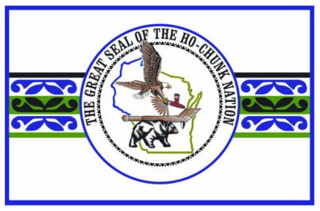
The Ho-Chunk Nation is a federally recognized tribe of the Ho-Chunk with traditional territory across five states in the United States: Wisconsin, Illinois, Iowa, Minnesota, and Missouri. The other federally recognized tribe of Ho-Chunk people is the Winnebago Tribe of Nebraska. The tribe separated when its members were forcibly relocated first to an eastern part of Iowa known as the Neutral Ground, then to Minnesota, South Dakota and later to the current reservation in Nebraska.

The Winnebago Tribe of Nebraska is one of two federally recognized tribes of Ho-Chunk Native Americans. The other is the Ho-Chunk Nation of Wisconsin. Tribe members often refer to themselves as Hochungra - "People of the Parent Speech". Their historic language is part of the Siouan family.
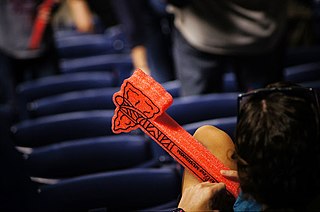
Since the 1960s, the issue of use of Native American and First Nations names for sports teams or mascots has been the subject of increasing public controversy in the United States and Canada. This has been a period of rising indigenous civil rights movements, and Native Americans and their supporters object to the use of images and names they consider derogatory. They have conducted numerous protests and tried to educate the public on this issue.

Native American tribes in the U.S. state of Nebraska have been Plains Indians, descendants of succeeding cultures of indigenous peoples who have occupied the area for thousands of years. More than 15 historic tribes have been identified as having lived in, hunted in, or otherwise occupied territory within the current state boundaries.

Angel De Cora Dietz (1871–1919) was a Winnebago painter, illustrator, Native American rights advocate, and teacher at Carlisle Indian School. She was the best known Native American artist before World War I.

The Washington Redskins name controversy involved the name and logo used until 2020 by the National Football League (NFL) franchise located in the Washington metropolitan area now known as the Washington Football Team. Native American groups had questioned the use of the "Redskins" name and image since the 1960s; the topic began receiving widespread public attention in the 1990s. In July 2020, following a wave of racial awareness and reforms in wake of national protests after the murder of George Floyd, major sponsors of the league and team threatened to stop supporting them until the name was changed. The team initiated a review which resulted in the decision to retire its name and logo, playing as the Washington Football Team pending adoption of a more permanent name. The permanent name will be announced in 2022. Team president Jason Wright announced in July 2021 that the new name will not include any ties to Native Americans, including the name "Warriors"; research having shown that anything other than a clean break with the past is a slippery slope.
The use of terms and images referring to Native Americans/First Nations as the name or mascot for a sports team is a topic of public controversy in the United States and in Canada, arising as part of the Native American/First Nations civil rights movements. Since the 1960s, there have been a number of protests and other actions by Native Americans and others targeting the more prominent use of such names and images by professional franchises such as the Cleveland Indians and the Washington Redskins. However, discourse surrounding mascot usage by elementary, middle, and high schools has been prominent, as these entities are subject to public legislation and community input.

The Chicago Blackhawks name and logo controversy refers to the controversy surrounding the name and logo of the Chicago Blackhawks, a National Hockey League (NHL) ice hockey team based in Chicago, Illinois. The use of terms and images referring to Native Americans/First Nations as the name or mascot for a sports team without permissions from or consultations with local Indigenous communitiesis a topic of public controversy in the United States and Canada. Since the 1960s, as part of the indigenous civil rights movements, there have been a number of protests and other actions by Native Americans and their supporters targeting the more prominent use of such names and images by professional franchises such as the Cleveland Indians of Major League Baseball (MLB) ; the Washington Football Team formerly known as the "Redskins" of the National Football League (NFL), the NFL's Kansas City Chiefs and MLB's Atlanta Braves, the latter two attracting criticism of "the tomahawk chop" often performed by their fans. Like other teams with tribal mascots, there are calls from Indigenous activists and organizations to change the Blackhawks' name and logo and eliminate tribal mascots and imagery throughout sports.
References
- ↑ Clemmons, Linda M. (May 1, 2019). Dakota in Exile: The Untold Stories of Captives in the Aftermath of the U.S.-Dakota War. University of Iowa Press. ISBN 9781609386344 – via Google Books.
- ↑ Sheldon, Addison Erwin; Sellers, James Lee; Olson, James C. (June 16, 2009). "Nebraska History". Nebraska State Historical Society – via Google Books.
- ↑ 'Kimmy Schmidt' Reality Check: Did First Redskins Coach Really Fake.., San Antonio Express-News April 18, 2016
- ↑ Barr, John (2 September 2014). "Was Redskins' first coach a fraud?". ESPN. Retrieved 6 January 2020.
- ↑ Addison Erwin Sheldon; James Lee Sellers; James C. Olson (2009). Nebraska History. Nebraska State Historical Society.
- ↑ Walker, Childs. "Heritage built on half-truth?". Baltimore Sun. Retrieved 6 January 2020.
- 1 2 Shin, Annys (7 February 2013). "Redskins name change demanded at Smithsonian forum". Washington Post. Retrieved 6 January 2020.
- ↑ "This Is The Home Of My Spirit – University Place". Twin Cities PBS. Retrieved 6 January 2020.
- ↑ Vargas, Theresa; Shin, Annys (5 October 2013). "President Obama says, 'I'd think about changing' name of Washington Redskins". Washington Post. Retrieved 6 January 2020.
- ↑ Harjo, Suzan Shown. "The R-Word Is Even Worse Than You Think". POLITICO Magazine. Retrieved 6 January 2020.
- ↑ Brady, Erik. "Dan Snyder defends Redskins name, cites 'heritage'". USA TODAY. Retrieved 6 January 2020.
- ↑ "This Is The Home Of My Spirit | University Place" – via video.tpt.org.
- ↑ Binkovitz, Leah. "Discussion at the American Indian Museum: Time to Put Racist Mascots to Bed". Smithsonian.
- ↑ "Grace Hudson Museum Calendar of Events" (PDF). SunLetter. Vol. 27 no. 2. Grace Hudson Museum. Summer 2018. p. 4.
- ↑ "Racist Stereotypes in Sports to be Discussed at NMAI Thursday". IndianCountryToday.com.
- ↑ "Steve Goddard's History Wire". Steve Goddard's History Wire.